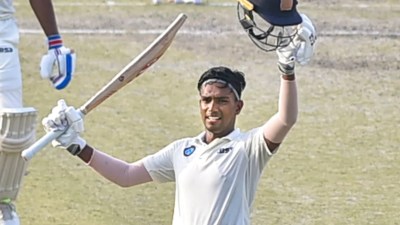Writing off the past
Inmates of Kolkatas Alipore jail pen down their hopes and anger in the literary journal,Nabarka.
Inmates of Kolkatas Alipore jail pen down their hopes and anger in the literary journal,Nabarka.
The jail log tucked under his left arm,Utthan Paul,in his clean grey shirt and brown trousers,has the air of a small-town schoolteacher about him. His room is a short walk from the imposing gates of the Alipore Central Correctional Home in south Kolkata. As you follow his five-foot-tall,rotund frame down a quiet alley inside,it takes you past a low iron gate beside a signboard that reads Hanging Area. It makes you stop,and think,especially about the implications of the surreal pink,green and blue hand-painted paisleys adorning the board. Paul intervenes helpfully. Look behind you. People like BC Roy,Netaji and Jagadish Chandra Bose were held by the British in those rooms at the top, he says with a smile,intent on putting a stop to the flurry of questions running in your head. After 16 years of serving a life term,Paul is a deft mind reader. And a part-amused,part-cynical spectator of life and society a personality that translates into his sharp essays that have been published in the literary magazine Nabarka (New Sun),brought out by the West Bengal Department of Jails.
As 56-year-old Paul settles down in the wide,cool porch in front of his cell,a shout away from the hanging area,he is joined by 33-year-old Debdas Ghosh and 51-year-old Basudeb Sharma. The three are among the several inmates of the 55 correctional homes across West Bengal,who have contributed to Nabarka. Its sixth edition,by far the biggest at 110 pages,came out last month and its launch was a star-studded affair with writers Amit Chaudhuri,Sunil Gangopadhyay,and artist Ramananda Bandopadhyay present. The idea was to have the inmates interact with literary luminaries in an effort to boost their self-esteem. Such open interaction also helps them feel less excluded from society, says BD Sharma,ADG and IG,West Bengal Correctional Services,who is directly involved in the editing and compilation of the magazine.
Quiet and withdrawn,Ghoshs eyes light up at the mention of the launch event. I met and spoke to people I had never thought I would meet. Sunil babu commended me on my effort and asked me to keep writing. Compliments have not come my way in a long time. I didnt expect it to make any difference,but it did feel very nice, says Ghosh. A computer science graduate from Basirhat in North 24 Parganas,Ghosh is visibly struggling with the idea of spending a greater part of the rest of his life in the prison. Theres a sense of dejection that echoes in his words. The only antidote to which,he says,is the written word. I come from a simple middle class family,where going to the police station itself was blasphemous. Sending me to jail five years ago was as good as killing me. I wanted to die. But the very place I thought would kill me has taught me to stay alive, he says. Ghosh used to dabble in poetry as a child and as he grew up,like most average Bengali boys,he discovered football and films.
His world turned upside down when he was 28. He was convicted of a crime (which he refuses to talk about) and sent to Alipore jail. It feels like digging old wounds, he mutters,scribbling in a fat diary open in front of him. After a year of struggling with acute depression,Ghosh turned to pen and paper. At first,I used to write whatever I felt. There was no form to it. Slowly,I tried casting my emotions into poetry. I have been writing ever since,but I dont show it to anyone. Its like talking to someone and easing a weight off my heart, says Ghosh. He made an exception for Nabarka. His Bengali poem Tomar Shure (In Your Melody) talks about him trying to look at life in a cell shunned by the sun with the strength that comes from the knowledge of divine justice. It ends with the lines,Tumi ki parbe na amai/Bhalobeshe buk e tene nite (Will you not pull me/Into a loving embrace)? I have been reading extensively about Swami Vivekananda and his philosophy. The poem is addressed to him, says Ghosh,who is now pursuing an MCA through an open university.
Sudip Basu,chief controller of correctional services at the Alipore Central Correctional Home,endorses the therapeutic powers of writing that his inmates have discovered. Some inmates whove only studied till class IV are writing short poems to voice their opinions about everything, he says. Like Sharma who was sentenced for life 12 years ago. The grocer from the suburbs of Kolkata had stopped going to school after class IV but has contributed a poem on the threat of terrorism to the country for Nabarka. I try and write a little. It feels good. I never miss the news or reading the newspaper. I write about my fears. Also,Utthan da inspires me a lot, he says shyly.
Paul used to be a member of the students wing of a political party in a college in Bardhaman district. The reason why I am here today, he says with a hint of irritation in his voice. Paul,who got involved in political violence in college,says he has closely seen the psychological manipulation of students by political parties. I am a victim. Through my 16 years here,I have seen many students goaded into violence being convicted. The politicians who initiate all this are leading comfortable lives, he says. Explaining his works,which include essays,one-act plays,poems and short stories,he says,What the students get themselves into at the behest of leaders is not politics it is malpractice. I write about it,since I have seen its workings very closely and when I read papers and watch TV,I realise its magnifying with every passing day. His essay Amar Bhabnai Shomaj (The Society in my Imagination) differentiates between criminals as we know them and as he has known them. Paul completed his masters in political science from Alipore through an open university.
Some ten minutes away from the Alipore Central Correctional Home is the Alipore Womens Correctional Home. In a spacious activity hall,some 30 women are pasting pieces of canvas on boards for an art workshop they are to attend a day later. Nandita Das,bent over a can of glue and a board,is frightfully quiet in a room full of talkative women. I dont want to talk about my past. All I can tell you is that I have no future and dont know what I will do even if I am released, says the 23-year-old from a village in Hooghly. Married off at a very young age to a much older man in Kolkata,she discontinued her education to look after her son. According to sources,Das was forced to help her husband in his bid to kill her sister-in-law and her son. Her husband absconded,and Das,then 21,was held for conspiracy and is now an undertrial. Her poem Jibon Amar (My Life),published in Nabarka,talks of staying afloat with hope even as one has no control over destiny. I feel like I am doing something worthwhile when I write. Also,I hope when my son grows up (he is four years old),he will try and understand his mother if he reads all this. He might have one small thing to be proud of, she says.
She has,for company,26-year-old Kakoli Mahato,who has already served four years of her five-year-sentence. Having studied till class IX,she passed her high school exam from jail. Her poem Phera (The Return) is addressed to her mother,who was shattered when Mahato was held for human trafficking. My mother wouldnt come to meet me. Gradually,when I started writing my diary,my sisters would read my poems when they visited me and would narrate them to my mother. That is when she realised I was repentant, she says. She writes in her poem: Tomar anchol tole/Tokhun keu toh amai chhute parto na (In the shade of your anchal/Nobody could touch me). Behind Alipores prison walls,these inmates have found their voice.
- 01
- 02
- 03
- 04
- 05































